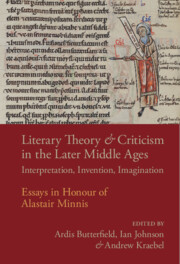Book contents
- Literary Theory and Criticism in the Later Middle Ages
- Literary Theory and Criticism in the Later Middle Ages
- Copyright page
- Contents
- Figures
- Contributors
- Preface and Acknowledgements
- Abbreviations and Conventions
- The Career and Contributions of Alastair Minnis
- Introduction
- Chapter 1 Access through Accessus
- Chapter 2 Scholastic Theory and Vernacular Knowledge
- Chapter 3 Poetics and Biblical Hermeneutics in the Thirteenth Century
- Chapter 4 Robert Holcot and De vetula
- Chapter 5 The Inspired Commentator
- Chapter 6 Guitar Lessons at Blackfriars
- Chapter 7 The Re-cognition of Doctrinal Discourse and Scholastic Literary Theory
- Chapter 8 Arts of Love and Justice
- Chapter 9 The Many Sides of Personification
- Chapter 10 Encountering Vision
- Chapter 11 George Colvile’s Translation of the Consolation of Philosophy
- Chapter 12 When Did the Emotions Become Political?
- Bibliography of the Works of Alastair Minnis
- Bibliography
- Index
Chapter 7 - The Re-cognition of Doctrinal Discourse and Scholastic Literary Theory
Affordances of Ordinatio in Reginald Pecock’s Donet and Reule of Crysten Religioun
Published online by Cambridge University Press: 20 April 2023
- Literary Theory and Criticism in the Later Middle Ages
- Literary Theory and Criticism in the Later Middle Ages
- Copyright page
- Contents
- Figures
- Contributors
- Preface and Acknowledgements
- Abbreviations and Conventions
- The Career and Contributions of Alastair Minnis
- Introduction
- Chapter 1 Access through Accessus
- Chapter 2 Scholastic Theory and Vernacular Knowledge
- Chapter 3 Poetics and Biblical Hermeneutics in the Thirteenth Century
- Chapter 4 Robert Holcot and De vetula
- Chapter 5 The Inspired Commentator
- Chapter 6 Guitar Lessons at Blackfriars
- Chapter 7 The Re-cognition of Doctrinal Discourse and Scholastic Literary Theory
- Chapter 8 Arts of Love and Justice
- Chapter 9 The Many Sides of Personification
- Chapter 10 Encountering Vision
- Chapter 11 George Colvile’s Translation of the Consolation of Philosophy
- Chapter 12 When Did the Emotions Become Political?
- Bibliography of the Works of Alastair Minnis
- Bibliography
- Index
Summary
This essay aims to show how one remarkable practitioner of vernacular scholastic literary theory, Reginald Pecock (d. c. 1361), Bishop of Chichester, deployed it to service diverse orders of worth in his works by at once upending and apparently re-accepting authorised ecclesiastical discourses, including the Ten Commandments, the Apostles’ Creed and orthodox definitions of God as creator or as infinite. Focusing especially on the theoretical category of ordinatio, it investigates how Pecock both upsets and re-accommodates such discourses in places where the articulation and control of spiritual authority in this world and the tapping of divine authority from the next were at stake. In both his rejection of standard doctrinal discourses and his (re)accommodation of them in his own new system, Reginald deploys a full repertoire of scholastic terms, practices and attitudes. Pecock’s novel and astoundingly ambitious reconfiguration of Christian knowledge and doctrine was a gargantuan programme, endeavouring to efface and outdo traditional discourses of the Church whilst at the same time taking pains palpably, even anxiously, to be equivalent or answerable to that which it would displace. Pecock, in attempting re-cognition of the familiar, ended up recognising it dissonantly within his own unfamiliar discourse.
Keywords
- Type
- Chapter
- Information
- Literary Theory and Criticism in the Later Middle AgesInterpretation, Invention, Imagination, pp. 137 - 158Publisher: Cambridge University PressPrint publication year: 2023

